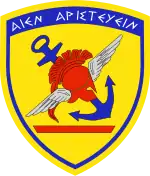Dionysios Arbouzis
Dionysios Arbouzis (Greek: Διονύσιος Αρμπούζης) was a Hellenic Army officer who rose to the rank of general and held the position of Chief of the Hellenic Armed Forces in 1974–76, after the fall of the Greek military junta. Arbouzis, with more than 13 years of combat experience, participated in World War II, in the Greek Civil War and the Korean War.[1][2]
Dionysios Arbouzis | |
|---|---|
| Native name | Διονύσιος Αρμπούζης |
| Born | c. 1912 Molaoi, Kingdom of Greece |
| Died | 30 January 1987 Third Hellenic Republic |
| Buried | |
| Allegiance | |
| Service/ | |
| Rank | |
| Unit | Greek Expeditionary Force in Korea |
| Commands held | ELDYK Chief of the Hellenic Armed Forces |
| Wars | World War II
Greek Civil War Korean War |
| Alma mater | Hellenic Military Academy |
| Other work | Minister for Northern Greece |
Arbouzis graduated from the Hellenic Army Academy and participated as an officer of the Greek Army in the major conflicts of World War II in Greece: Greco-Italian War (1940–1941), Battle of Greece (1941), as well as the Greek Civil War (1946–1949).[2] During the Greco-Italian War, he participated, as battalion commander in the 33rd Infantry Regiment, in the Battle of Hill 717 during the Italian spring offensive.[3]
He is also notable as a commander of the Greek Expeditionary Force in Korea during the Korean War, as the first commander (as a colonel, in 1960) of the Hellenic Force in Cyprus, and as a commander of the Hellenic Army Academy (as a major general, in 1965–66). In 1967, at the time of the 21 April coup, he was Second Deputy Chief of the Hellenic Army General Staff, and was well known for his dedication to the constitutional order. On the day of the coup, he was arrested by the plotters and dismissed from the army by the new regime. He was recalled to active service, promoted to full general and installed as head of the armed forces after the fall of the junta in August 1974, and held the position until 1976. In 1977, he served for a month (21 October – 28 November) as Minister for Northern Greece under Konstantinos Karamanlis in the caretaker cabinet during the 1977 legislative elections.
He died in 1987 and is buried in the First Cemetery of Athens, on February 3.[4]
References
- Daily, Edward L. (1992). "Skirmish" red, white and blue : the history of the 7th U.S. Cavalry, 1945–1953. Paducah, Ky.: Turner Pub. Co. p. 73. ISBN 978-1-56311-088-7.
- Tucker, Spencer C., ed. (2000). Encyclopedia of the Korean War : a political, social, and military history. Santa Barbara, Calif.: ABC-CLIO. p. 228. ISBN 978-1-57607-029-1.
- Carr, John (2020). Mussolini's Defeat at Hill 731, March 1941: How the Greeks Halted Italy's Albanian Offensive. Pen and Sword Military. p. 48. ISBN 978-1-526-76504-8.
- Ta Nea, 2-2-1987, p.26.
